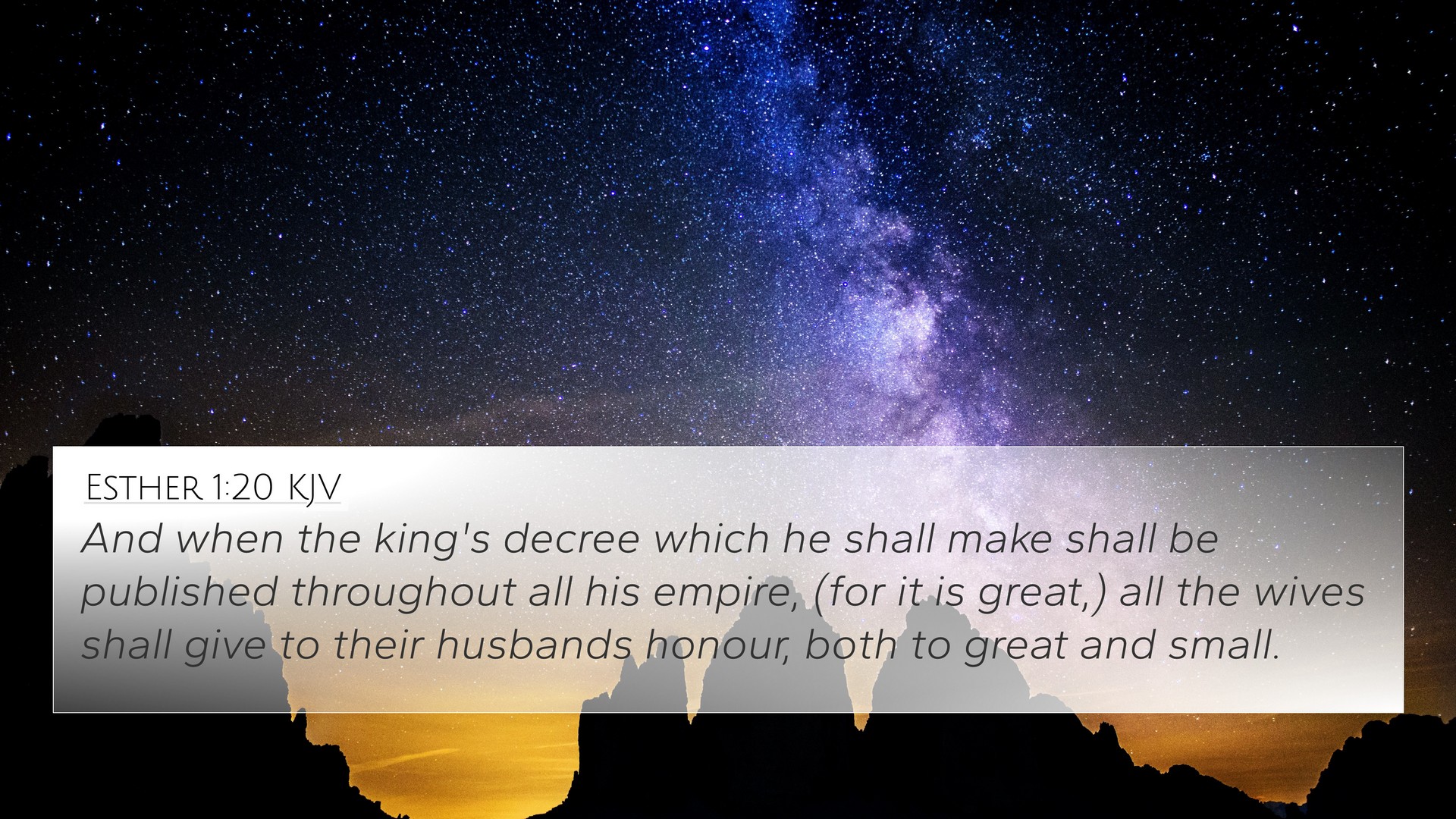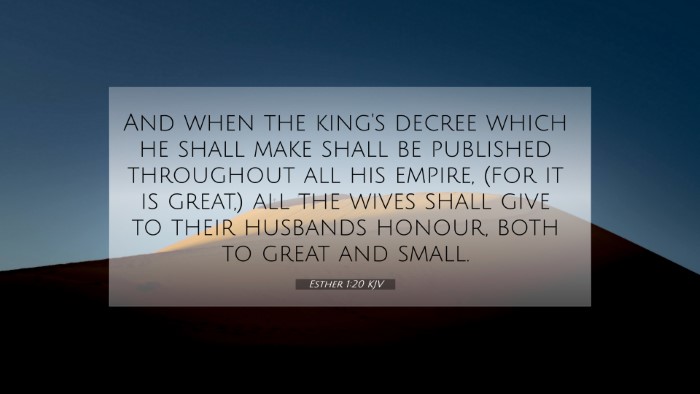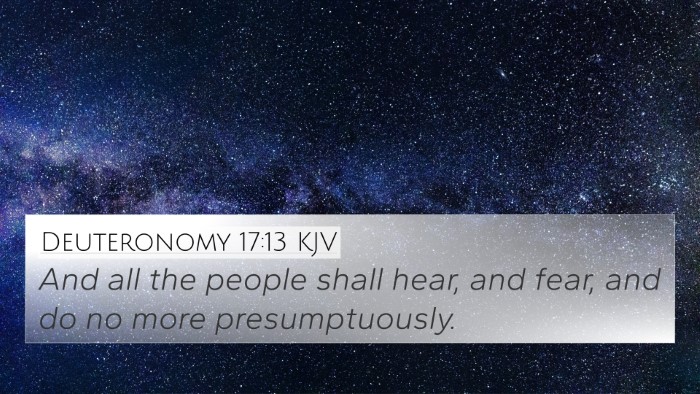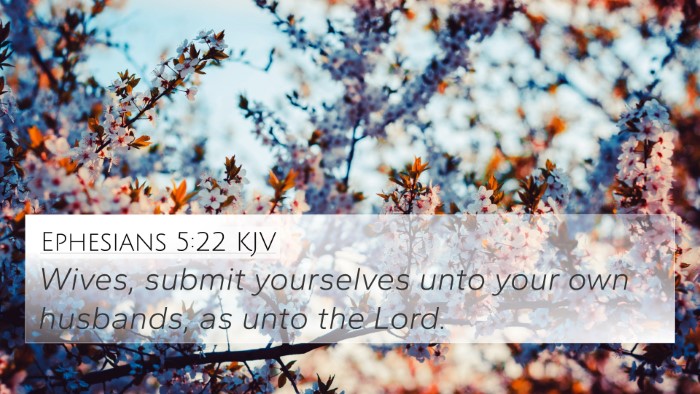Old Testament
Genesis Exodus Leviticus Numbers Deuteronomy Joshua Judges Ruth 1 Samuel 2 Samuel 1 Kings 2 Kings 1 Chronicles 2 Chronicles Ezra Nehemiah Esther Job Psalms Proverbs Ecclesiastes Song of Solomon Isaiah Jeremiah Lamentations Ezekiel Daniel Hosea Joel Amos Obadiah Jonah Micah Nahum Habakkuk Zephaniah Haggai Zechariah MalachiEsther 1:20 Similar Verses
Esther 1:20 Cross References
And when the king's decree which he shall make shall be published throughout all his empire, (for it is great,) all the wives shall give to their husbands honour, both to great and small.
Uncover the Rich Themes and Topics of This Bible Verse
Listed below are the Bible themes associated with Esther 1:20. We invite you to explore each theme to gain deeper insights into the Scriptures.
Esther 1:20 Cross Reference Verses
This section features a detailed cross-reference designed to enrich your understanding of the Scriptures. Below, you will find carefully selected verses that echo the themes and teachings related to Esther 1:20 KJV. Click on any image to explore detailed analyses of related Bible verses and uncover deeper theological insights.

Ephesians 5:33 (KJV) »
Nevertheless let every one of you in particular so love his wife even as himself; and the wife see that she reverence her husband.
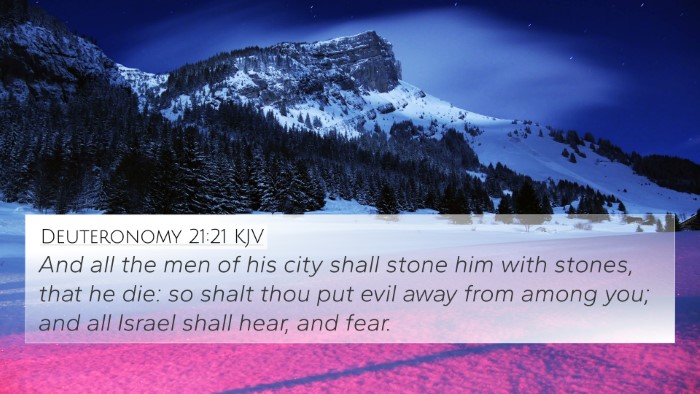
Deuteronomy 21:21 (KJV) »
And all the men of his city shall stone him with stones, that he die: so shalt thou put evil away from among you; and all Israel shall hear, and fear.
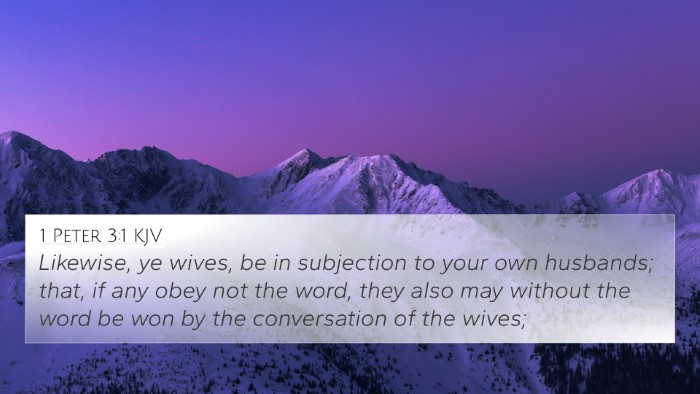
1 Peter 3:1 (KJV) »
Likewise, ye wives, be in subjection to your own husbands; that, if any obey not the word, they also may without the word be won by the conversation of the wives;
Esther 1:20 Verse Analysis and Similar Verses
Understanding Esther 1:20
Esther 1:20 states:
"And when the king's decree, which he shall make, shall be published throughout all his empire, for it is great, all the wives shall give to their husbands honour, both to great and small."
Summary of Meaning
This verse is a part of the narrative that unfolds around Queen Vashti's disobedience to King Ahasuerus, which has significant implications for the unfolding story of Esther. The king's command illustrates themes of authority, respect, and societal expectations of women during this period.
Commentary Insights
- Matthew Henry: Matthew Henry highlights the role of submission within marriage dynamics as expected in Persian culture. He points out that the decree emphasizes the necessity of respect towards husbands, noting that the instruction is designed to uphold the king's authority and social order.
- Albert Barnes: Albert Barnes focuses on the political implications of the king's decree, asserting that Vashti's refusal had far-reaching consequences that would eventually lead to Esther's rise to queen. Barnes notes that the public nature of the decree reinforced the established hierarchy while generating tension between personal freedom and social obligations.
- Adam Clarke: Adam Clarke comments on the decree's implications for women in the context of the ancient Near Eastern customs. He states this is a significant reflection of societal norms concerning male dominance and female subservience, indicative of the legal and moral expectations of the day.
Cross-References and Connections
To gain deeper insights into Esther 1:20, we can explore various Bible verse cross-references that relate to its themes:
- Proverbs 31:10-31: This passage extols the virtues of a noble wife, providing a contrast to Vashti's actions and illustrating the balance between honor and agency.
- Ephesians 5:22-24: These verses discuss the relationship between husbands and wives, underscoring the biblical view of marital submission and respect.
- 1 Peter 3:1-2: This passage mentions how wives should conduct themselves in relation to their husbands, guiding their actions even in difficult situations.
- Genesis 3:16: This verse speaks to the consequence of the Fall, whereby the relationship dynamics between men and women became fraught with struggle.
- Colossians 3:18: A reiteration of the need for wives to submit to their husbands, it emphasizes the principle of orderliness within the household.
- Matthew 20:25-28: Although addressing leadership, these verses also show a contrast between worldly authority and the type of service expected among Christians.
- Malachi 2:14-16: Points to the sanctity of marriage and the importance of fidelity and respect between spouses.
Thematic Connections
Through these references, we can verify the thematic connections surrounding Esther 1:20:
- Authority and Compliance: The nature of authority in marital relationships.
- Public Influence: The impact of public decrees on private lives.
- Honor and Respect: Cultural norms that dictate treatment within marriages.
- Consequences of Rebellion: How acts of disobedience can shift narratives and lives, as seen in the life of Esther.
Inter-Biblical Dialogue
Esther 1:20 fits within a broader inter-Biblical dialogue highlighting the various cultural norms surrounding marriage and authority:
- Comparative Analysis of Old and New Testament: The contrast between Old Testament customs, as illustrated in Esther, and New Testament teachings that emphasize mutual respect and love in relationships.
- The Role of Women: The evolution of women's roles in scripture, from Esther's time to the teachings of Paul in the letters to the early churches.
- Cultural vs. Spiritual Authority: How scripture contextualizes authority figures in both social and spiritual realms, as seen in different biblical accounts.
Conclusion
Esther 1:20 encapsulates a critical point in the narrative that leads to the eventual rise of a courageous leader within Israel's history. The connections drawn through cross-referencing biblical texts reveal a profound understanding of authority, respect, and the complex role of women in the biblical narrative. Such insights are crucial for anyone engaging in bible cross-reference studies.
